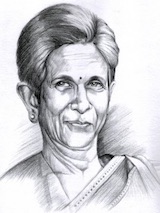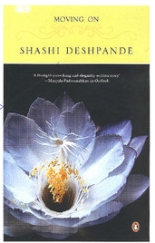Shashi Deshpande
|
|
Shashi Deshpande is an award winning Indian Novelist. She is the second daughter of famous Kannada dramatist and writer Sriranga. She was born in 1938 Karnataka and educated in Bombay and Bangalore.She published her first collection, of short stories in 1978, and her first novel The Dark Holds No Terrors in 1980. She is a winner of the Sahitya Akademi Award, for the novel ‘That Long Silence’. Her works also includes children’s books. Shashi Deshpande’s novels present a social world of many complex relationships. In her novels many men and women living together, voyaging across life in their different age groups, classes and gendered roles. The old tradition bound world coexists with the modern, creating unforeseen gaps and disruptions within the family fold. Women’s understanding becomes questionable as the old patterns of behavior no longer seem to be acceptable. These struggles become intense quests for self-definition, because it would not be possible to relate to others with any degree of conviction unless one is guided by clarity about one’s own image and role. Shashi Deshpande, an eminent novelist, has emerged as a writer possessing deep insight into the female psyche. Focusing on the marital relation she seeks to expose the tradition by which a woman is trained to play her subservient role in the family. Her novels reveal the man-made patriarchal traditions and uneasiness of the modern Indian woman in being a part of them. Shashi Deshpande uses this point of view of present social reality as it is experienced by women. To present the world of mothers, daughters and wives is also to present indirectly the fathers, sons and husbands the relationships between men and women, and between women themselves. Her young heroines rebel against the traditional way of life and patriarchal values. The words which we always associate with what we consider to be the concept of an ideal woman are self-denial, sacrifice, patience, devotion and silent suffering. As in the ‘The Dark Holds No Terrors’, the life of Sarita who is always neglected and ignored. ‘Roots and Shadows’ explores the inner self of Indu, Mini, and Akka. Starting a Shashi Deshpande novel is like sitting in a railway compartment and resigning oneself to an endless journey into the night of middle-class India. The very proximity of the stranger sitting opposite is disturbing. On top of this, he, or most likely she, is the kind who will stake her territory with carefully rolled bedding, one who would bring out a stainless steel tiffin carrier and insist that you partake of a meal with her. At the same time Deshpande’s skill is such that by the end of the journey you are completely enwrapped in the lives of the people that she forces you to contemplate. The very blandness of her characters, the ordinariness with which she anoints them at the outset gradually works in their favor. Every life, she seems to be telling us, has its own meaning and in the general bleakness, this itself becomes a source of strength. That life is not only a parade of colors and sounding of distant trumpets, as the more flamboyant storyteller has told us, but an examination of the way in which people get on with their lives, one step at a time. (Dr. Nidhi Bhatt, Head Department of English Pragati College of Engineering and Management India, Raipur, Chhattisgarh)
Video: Shashi Deshpande at Bangalore Literature Festival (35:47) |


 Strangers to Ourselves
Strangers to Ourselves Moving On
Moving On